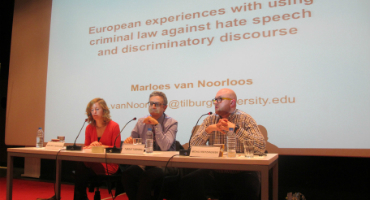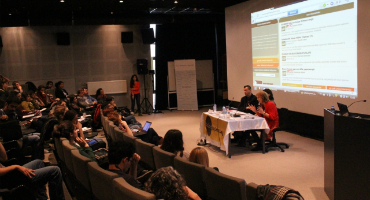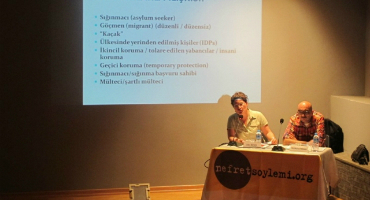The panel titled “Discriminatory Discourse and The Role of The Media” organized by the Hrant Dink Foundation in collaboration with Istanbul Bilgi University Sociology Department has been realized in 2012, September 12. Prof. Teun van Dijk, one of the world’s most prominent scholars in the field of critical discourse studies and Prof. Charles Husband, internationally known with his work on media and ethnic diversity gave two talks under the moderation of Prof. Arus Yumul, professor of sociology at Istanbul Bilgi University.
After defining the concept of hate speech, Charles Husband focused on its core roots followed by the role of the media in disseminating such discourse. As the roots of hate speech, he focused on historical trajectories of ingroup identity development in relation with historical construction of categorical antipathies. He then added that even if the raw material of hate speech can be found in the historical cultural deposits, it is not sufficient to explain why such discourse still has an appeal and relevance in the comptemporary world. He asserted that in order to explain the powerful venomous content of hate speech we need to understand the ego involvement of individuals in this process. In the contemporary world where there is rapid change and where the nation state can no longer guarantee security and stability, the zeitgeist is characterised by uncertanity and stress where individuals feel both realistic and symbolic threats. These factors combined with the historically developed negative stereotypes result in the legitimization of such discourse. He continued his talk by focusing on the media as a powerful instrument for disseminating such discourse. He emphasized the fact that such discourse does not find its way into the media by a “random process of journalistic xenophobia” but rather is a logical expression of political economy that must be understood through patterns of ownership and control shaping the editorial policy.
After Charles Husband, Prof. Teun A. van Dijk presented the basic framework for how racism, nationalism, sexism and other forms of domination are produced and reproduced in the society through discourse in the mass media, political discourse, and educational discourse. He started by saying that he finds the usage of the term “hate speech” wrong as it emphasizes a human emotion which is very personal. Racism and other forms of domination cannot be reduced to individual forms of hate but rather are related with group processes such as power relations between dominant and dominated groups and reproduction of domination in the society, he added. Dijk drew attetion to the process of news production where only the dominant groups’ representatives are referred to as the news source while the representatives of minority groups are taken as unreliable and biased. He then emphasized the fact that racist and sexist ideologies are learned through public forms of discourse and that they can also be unlearned again through discourse which makes education very significant in combatting with such discourse.





